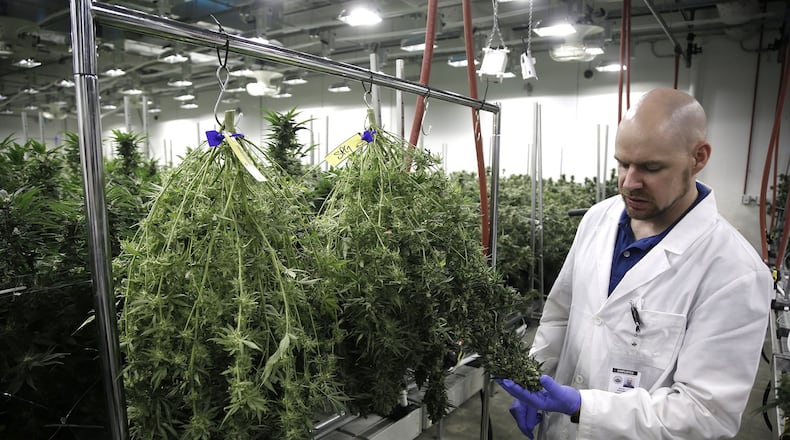Callahan, of West Milton, said she and others in southwest Ohio might benefit from cannabis treatment but aren’t among the 3,575 of patients to have activated a marijuana card since the patient registry went live Dec. 3. She and others are holding off because of the cost to get a doctor’s recommendation and the lone approved dispensary in the state is in Wintersville, a three-and-a-half-hour drive east from Dayton.
RELATED: First Ohio medical marijuana store gets OK to open
“People are worried that they are not going to be able to afford it and are going to have to drive a lot further than they want to,” she said. “Those are basically the main concerns from me and my patient community right now.”
While the first legal sale of medical marijuana didn’t happen in 2018 as Ohio’s law allowed, officials say the slow-to-develop program is ready to deliver.
“There will be product available really, really soon,” Mark Hamlin, a senior policy advisor at the Ohio Department of Commerce, said recently. “We know the initial product will be very small.” “It will be limited as well, and it will be plant material only as we wait for processors to come online.”
The Wintersville dispensary, CY+, received its certificate of operation last month. Another 55 dispensaries have provisional licenses, according to the Ohio Department of Commerce. A dozen are set to eventually open in southwest Ohio including two in Cincinnati, two in Dayton, two in Springfield and one each in Beavercreek, Columbia, Lebanon, Monroe, Riverside and the Village of Seven Mile.
Despite the objections of some Oregon Historic District neighbors to one of the Dayton dispensaries, the Dayton Landmark Commission last month approved revised plans for the Strawberry Fields dispensary proposed for 333 Wayne Ave., as long as the color scheme met certain conditions.
RELATED: Oregon District medical marijuana store gets OK; some neighbors not happy
It took longer than officials expected for four major aspects of the program to become established and meet state approvals. Cultivators, testing labs, dispensaries – as well as doctors and patients – all require certain certifications.
Only plant material for vaping will be available at first because no processors have been approved to begin making products like edibles, oils and tinctures. Smoking medical marijuana is forbidden by the law approved in 2016.
At least three cultivators have marijuana grown and dried for market.
“We have product ready,” said Jason Erkes, a spokesperson for Cresco Labs, owner of the first approved dispensary in the state and operator of a cultivation facility in Yellow Springs that brought in its first harvest last month.
“It’s really in the hands of the testing facilities right now,” he said. “They are calibrating their equipment, and as soon as their equipment is calibrated and ready to accept our product for tests, we are ready to go.”
WATCH: How medical marijuana will be cultivated in this large Yellow Springs facility
North Coast Testing Laboratories in Streetsboro — as of Monday the only lab with approval to open — will likely test the state’s first batch of medical pot.
A testing lab at Hocking Technical College received a final inspection last month but hasn’t been given the green light to open. Provisional licenses for testing labs have also been awarded to ACT Laboratories, Battelle Memorial Institute and Central State University.
The university in Greene County plans to open the Central State Institute of Medical Marijuana, a multimillion-dollar lab that will test and research cannabis with guidance and capital from a Springfield company, Buckeye Agriculture, LLC.
It could be up to six months before the institute is given approved to open, Laura Wilson, the university’s attorney, said recently. The delay is due to many factors, including working through regulatory issues because marijuana is illegal at the federal level and the financial aid funding that flows through the federal Department of Education, she said.
No matter when pot first becomes available, the supply certainly won’t meet the patient demand, Hamlin said.
“We’ve seen kind of the choppy beginnings in every state that has done this,” he said. “But we do think that what we are seeing from the other cultivators coming from behind that it’s going to ramp up pretty steadily even in January and into the spring.”
MORE: From guns to marijuana: How Ohio’s laws changed this year
Some prospective patients have put the cost of getting an approved doctor’s recommendation at $345 or more. Ohio Marijuana Card, which has offices in Akron, Beavercreek, Cleveland, Columbus, Sharonville and Toledo, charges $280 for a year’s service, which can be paid through installments, according to the company. Ohio medical marijuana patients are also required to pay the state an annual $50 registration fee, though discounts may apply to veterans and indigent patients.
Callahan said she will wait a while longer hoping competition among doctors brings prices down and dispensaries open closer to home.
“We’ve all been patient for over two years now,” she said.
About the Author

